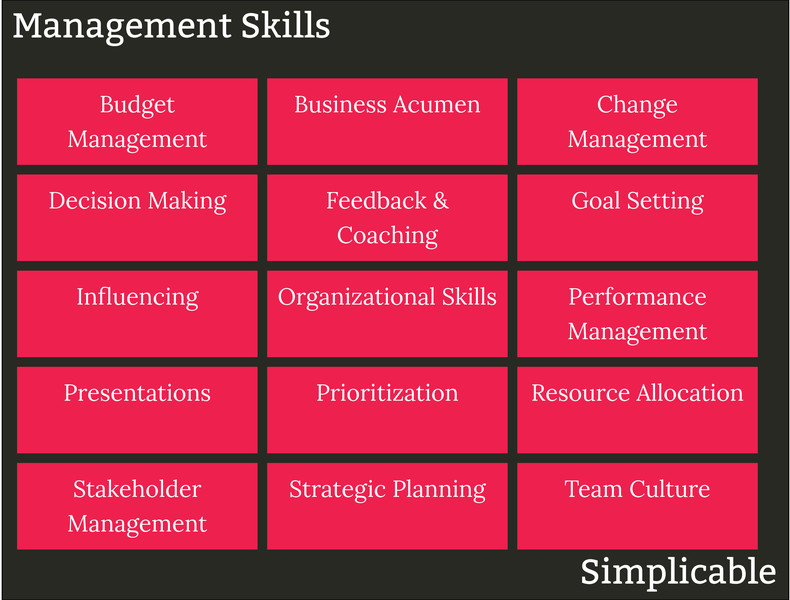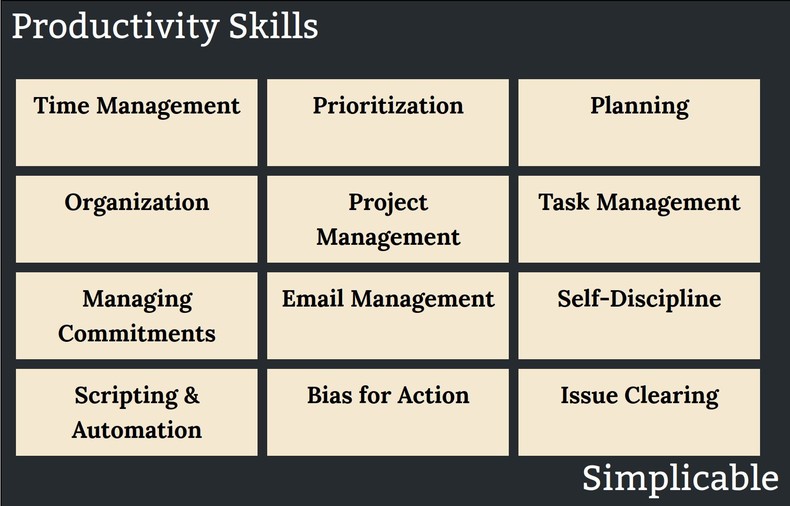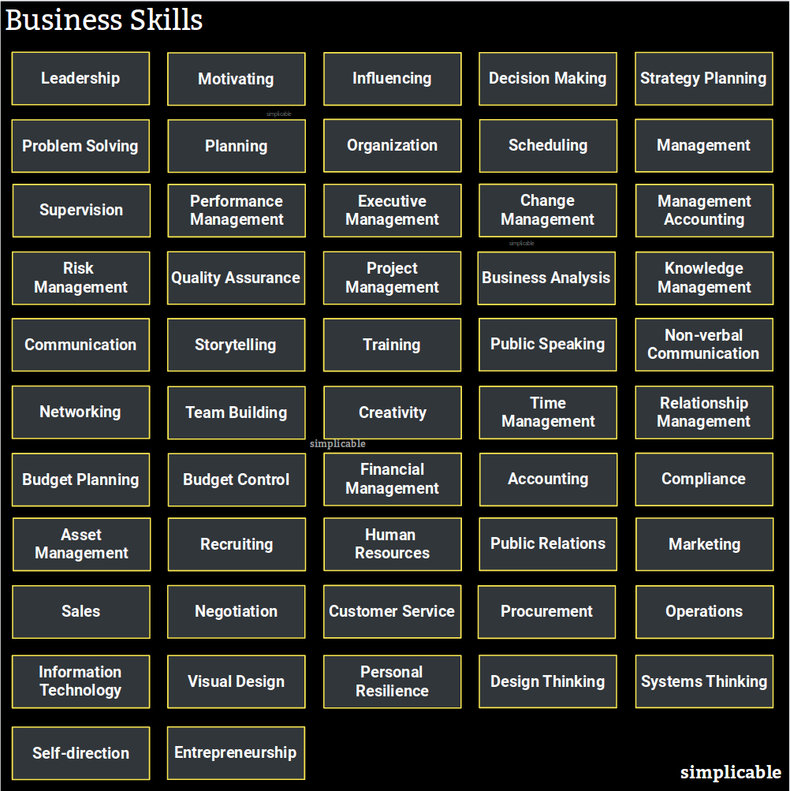Brand management | Budgeting |
Business analysis | Business continuity |
Business development | Change management |
Communication | Competitive analysis |
Compliance | Conflict management |
Conflict resolution | Cost analysis and control |
Crisis management | Customer advocacy |
Customer analytics & insights | Customer relationship management |
Customer retention | Customer satisfaction |
Customer service | Customer support |
Cybersecurity | Data analysis |
Decision making | Employee development |
Employee engagement | Finance |
Financial management | Forecasting |
Governance | Handling stress, ambiguity and criticism |
Information security | Inventory management |
Market differentiation & positioning | Market research |
Marketing | Marketing analysis |
Marketing automation | Negotiation |
Networking & relationship building | Operations management |
Organizational skills | Performance management |
Presentation skills | Problem solving |
Process improvement | Procurement |
Product development | Product management |
Project coordination | Project management |
Public Speaking | Quality assurance & control |
Recruiting | Reporting |
Risk assessment | Risk management |
Sales closing | Sales forecasting |
Sales management | Sales operations |
Social responsibility initiatives | Stakeholder management |
Strategic partnerships | Strategic planning |
Supervision | Supply chain management |
Team management | Teamwork |
Time management | Vendor management |
Management
Management is the direction and control of resources and teams to achieve goals in an environment of competition and constraints. The following are foundational management skills.
Customer Service
Skills related to customer service, customer relationships and customer experience.
Productivity Skills
Productivity skills relate to how much value you can produce in a unit of time for your employer. Some of these skills, such as delegation, are so commonly used on resumes and job descriptions that they can begin to feel cliche.
Core
The following is a complete list of core business skills that are commonly used in resumes and job descriptions.
Skill Descriptions
Leadership | Leadership is the ability to get teams moving in the same direction towards common objectives and goals. |
Motivating | Motivating is the ability to get others to act. |
Influencing | The ability to influence the thoughts, opinions, decisions and strategies of others. |
Decision Making | Researching possibilities, modeling alternatives and making rational decisions. |
Strategy Planning | Developing plans to achieve goals in an environment of competition and constraints. |
Problem Solving | Developing solutions to problems. |
Planning | The ability to identify a series of steps that achieve an objective. |
Organization | The orchestration of resources to achieve a goal. |
Scheduling | Planning time to achieve a goal. |
Supervision | A common term for managing employees who require significant direction and monitoring. This term isn't typically applied to knowledge workers. |
Performance Management | The process of agreeing to objectives with each employee and then evaluating performance against those objectives to reward high performance and act to improve low performance. |
Executive Management | Managing an entire organization or a top level organizational capability such as marketing, information technology or operations. |
Change Management | The practice of leading change to overcome resistance to change. |
Management Accounting | Developing measurements and metrics that support management objectives such as process improvement. Management accounting is not to be confused with financial accounting. |
The process of identifying, analyzing, measuring, treating and monitoring risk. | |
Quality Assurance | Quality assurance is the process of controlling and improving quality. |
Project Management | Project planning and control of implementation. Project management skills are mostly related to knowledge of project management methodologies and experience managing projects. |
Business Analysis | The practice of gathering, organizing, calculating, modeling and designing information to produce business outcomes. |
Knowledge Management | Managing processes for developing, capturing, controlling, securing, sharing and using knowledge. |
Communication | The ability to communicate meaning with visuals and words. |
An advanced form of communication that implies an ability to make information interesting and engaging. | |
Training | The ability to improve the knowledge and abilities of others. |
The ability to communicate to a group. | |
Non-verbal Communication | Non-verbal communication such as eye contact and body language. |
Networking | The ability to meet new people, make a good impression and develop relationships. |
Team Building | Leading a team to develop positive working relationships, norms and expectations. |
Creativity | The ability to develop strategy, work products and solutions that are non-obvious and valuable. |
Time management is the practice of making good use of time to improve your productivity and quality of life. | |
Relationship Management | The ability to sustain positive relationships with customers, partners and other stakeholders. |
Budget Planning | Developing estimates and budgets. |
Budget Control | Administering budgets according to accounting practices and the policies of an organization. |
Financial Management | Managing financial resources including assets and spending. |
Accounting | The summary, analysis, reporting and monitoring of financial transactions and accounts. Requires knowledge of accounting standards, practices and controls. |
Compliance | Experience in implementing processes of compliance and knowledge of laws, regulations and standards. |
Asset Management | Controlling assets throughout their lifecycle including procurement, implementation, operation, maintenance and disposal. |
Recruiting | Recruiting related skills such as interviewing and making hiring decisions. |
Human Resources | Management and implementation of hire to retire processes. This is a broad area that includes recruiting, employer branding, employee relations, organizational culture, compensation, benefits, training & development and performance management. |
Public Relations | Managing relationships and communications to stakeholders and the media. |
Marketing | Marketing related skills in areas such as advertising, promotion, product development, pricing and distribution. |
Sales | Managing sales processes, prospecting, developing opportunities and closing sales. |
Negotiation | The ability to make agreements with favorable terms. |
Customer Service | Customer service includes any interaction with a customer such as sales, service and support. This is related to people skills and experience in a service culture. |
Procurement | The process of procuring goods and services. This is a compliance heavy activity that is also related to product development, service delivery, logistics and quality assurance. |
Operations | Operations refers to the core business processes of an organization. These processes vary by industry. As such, operations skills are often industry specific and cover processes such as logistics, service fulfillment and manufacturing. |
>Information Technology | A broad range of skills related to information technology use, administration, management, development, operations, architecture and infrastructure. |
Visual Design | The ability to design graphics and visual information. |
The ability to handle stress and problems without loss of focus, enthusiasm and professional composure. | |
Design Thinking | The ability to use the process of design to solve problems in areas that aren't traditionally viewed as design problems. For example, a manager who improves the culture of a team by designing better meeting agendas. |
Systems Thinking | The ability to deal with complex of systems that involve a large number of variables. This typically requires the design of unusually simple and elegant solutions. For example, applying the principle of waste is food to solve a broad range of environmental problems. |
Self-direction | The ability to define your own mission, obtain resources, overcome problems and deal with ambiguity to be productive without any guidance or direction from others. |
Entrepreneurship | A creative form of self-direction whereby an individual creates valuable new organizations, industries, business models and processes with full accountability for the success or failure of a venture or enterprise. |





























